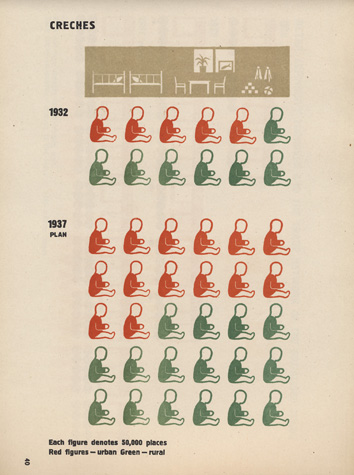
The Second Five-Year Plan
page from book, 1934, 220 x 320 mm (shown rotated 90º cw), (I.C. 10.3)
Although the majority of materials produced by the IZOSTAT Institute were for use within the USSR, it also published items for the purposes of overseas propaganda. The image above is taken from The Second Five-Year Plan in construction (1934), an English-language book that contains a translation of the 'resolution of the XVII congress of the Communist Party of the Soviet Union on the reports of comrades Molotov and Kuibyshev about the Second Five-Year Plan of development of the national economy of the USSR (1933-1937)', together with forty-five IZOSTAT charts.
These charts not only record the achievements claimed for the First Five-Year Plan (1928-32) but also what would be achieved over the next three years in the Second Five-Year Plan. This visual statement of future success was a typical feature in IZOSTAT charts. In the image above we can see the proposed increase in places in urban and rural crèches for 1937.
1934 was the last year that Neurath and his Viennese team worked with the Soviets, and this chart demonstrates the tremendous influence Gerd Arntz in particular had on IZOSTAT work. After that date, the appearance of IZOSTAT charts changed, now conforming to the demands of socialist realism by introducing more illustration and adding greater detail to their pictograms. The charts in this book, however, are without unnecessary detail and would have presented their audience with evidence not only of Soviet economic and social achievement, but also the development within the USSR of innovative, modern design. (EM)
area of research: the Izostat Institute, Moscow (Minns)











